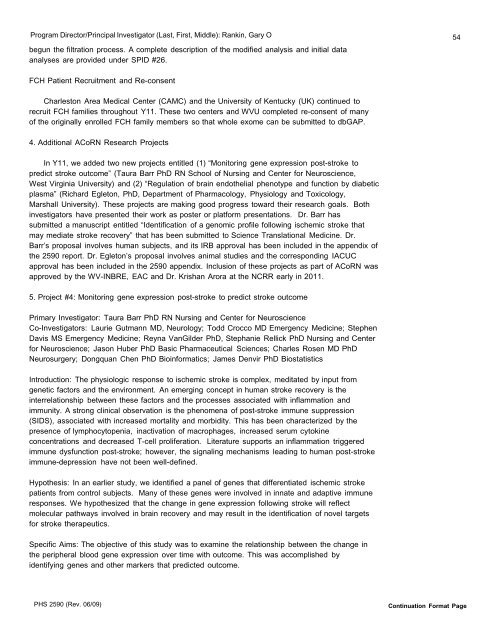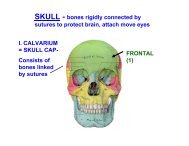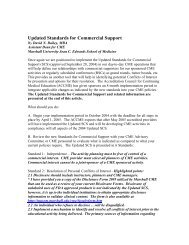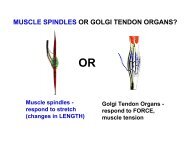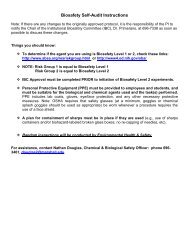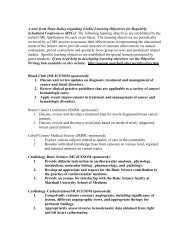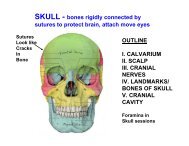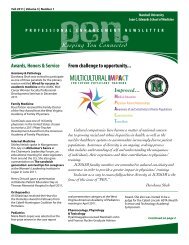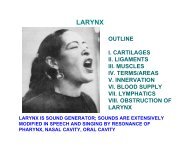Program Director/Principal Investigator (Last, First, Middle): Rankin, Gary O 54begun the filtration process. A complete description <strong>of</strong> the modified analysis and initial dataanalyses are provided under SPID #26.FCH Patient Recruitment and Re-consentCharleston Area Medical Center (CAMC) and the University <strong>of</strong> Kentucky (UK) continued torecruit FCH families throughout Y11. These two centers and <strong>WV</strong>U completed re-consent <strong>of</strong> many<strong>of</strong> the originally enrolled FCH family members so that whole exome can be submitted to dbGAP.4. Additional ACoRN Research ProjectsIn Y11, we added two new projects entitled (1) “Monitoring gene expression post-stroke topredict stroke outcome” (Taura Barr PhD RN <strong>School</strong> <strong>of</strong> Nursing and Center for Neuroscience,West Virginia University) and (2) “Regulation <strong>of</strong> brain endothelial phenotype and function by diabeticplasma” (Richard Egleton, PhD, Department <strong>of</strong> Pharmacology, Physiology and Toxicology,Marshall University). These projects are making good progress toward their research goals. Bothinvestigators have presented their work as poster or platform presentations. Dr. Barr hassubmitted a manuscript entitled “Identification <strong>of</strong> a genomic pr<strong>of</strong>ile following ischemic stroke thatmay mediate stroke recovery” that has been submitted to Science Translational Medicine. Dr.Barr’s proposal involves human subjects, and its IRB approval has been included in the appendix <strong>of</strong>the 2590 report. Dr. Egleton’s proposal involves animal studies and the corresponding IACUCapproval has been included in the 2590 appendix. Inclusion <strong>of</strong> these projects as part <strong>of</strong> ACoRN wasapproved by the <strong>WV</strong>-<strong>INBRE</strong>, EAC and Dr. Krishan Arora at the NCRR early in 2011.5. Project #4: Monitoring gene expression post-stroke to predict stroke outcomePrimary Investigator: Taura Barr PhD RN Nursing and Center for NeuroscienceCo-Investigators: Laurie Gutmann MD, Neurology; Todd Crocco MD Emergency Medicine; StephenDavis MS Emergency Medicine; Reyna VanGilder PhD, Stephanie Rellick PhD Nursing and Centerfor Neuroscience; Jason Huber PhD Basic Pharmaceutical Sciences; Charles Rosen MD PhDNeurosurgery; Dongquan Chen PhD Bioinformatics; James Denvir PhD BiostatisticsIntroduction: The physiologic response to ischemic stroke is complex, meditated by input fromgenetic factors and the environment. An emerging concept in human stroke recovery is theinterrelationship between these factors and the processes associated with inflammation andimmunity. A strong clinical observation is the phenomena <strong>of</strong> post-stroke immune suppression(SIDS), associated with increased mortality and morbidity. This has been characterized by thepresence <strong>of</strong> lymphocytopenia, inactivation <strong>of</strong> macrophages, increased serum cytokineconcentrations and decreased T-cell proliferation. Literature supports an inflammation triggeredimmune dysfunction post-stroke; however, the signaling mechanisms leading to human post-strokeimmune-depression have not been well-defined.Hypothesis: In an earlier study, we identified a panel <strong>of</strong> genes that differentiated ischemic strokepatients from control subjects. Many <strong>of</strong> these genes were involved in innate and adaptive immuneresponses. We hypothesized that the change in gene expression following stroke will reflectmolecular pathways involved in brain recovery and may result in the identification <strong>of</strong> novel targetsfor stroke therapeutics.Specific Aims: The objective <strong>of</strong> this study was to examine the relationship between the change inthe peripheral blood gene expression over time with outcome. This was accomplished byidentifying genes and other markers that predicted outcome.PHS 2590 (Rev. 06/09)Continuation Format Page
Program Director/Principal Investigator (Last, First, Middle): Rankin, Gary O 55Methods: Peripheral blood samples were collected from diagnosed ischemic stroke patients within24 hours from last known normal and 24-48 hours later.Total RNA was extracted from whole bloodstabilized in PAXgene RNA tubes, amplified, and hybridized to Illumina HumanRef-8v2 bead chips.Gene expression was compared in a univariate manner between stroke patients at both time pointsand outcome using t-test in GeneSpring. Inflation <strong>of</strong> type one error was corrected by Bonferroni andIngenuity Systems Pathway analysis (IPA) was performed. A validation cohort <strong>of</strong> n=10 ischemicstroke patients was recruited from <strong>WV</strong>U Ruby Memorial Hospital. Following cDNA amplification <strong>of</strong>whole blood RNA, real-time PCR was completed using TaqMan probes specific for Arg1, CA4,CCR-7, CSPG2, IQGAP, LY96, MMP-9, Orm1, S100A12, TLR2 or TLR4 and β-Actin was used asa housekeeping control. In addition, a retrospective study <strong>of</strong> n=122 patients who underwentendovascular therapy for acute ischemic stroke (AIS) from 2008-2011 was conducted to identifythe relationship between the neutrophil-lymphocyte stress factor (NLSF) and 90 day strokerecovery. An additional component <strong>of</strong> this project is the measurement <strong>of</strong> gene expression at 5 dayspost-stroke; recruitment is ongoing for this part <strong>of</strong> the project and is scheduled to be completed byJune 2012.Results: There were 21 genes with 1.5 fold difference in expression (Bonferroni corrected p2 fold(LY96, IL8, and SDPR). Pathway analysis revealed cytotoxic t-lymphocyte antigen 4 (CTLA4) anddopamine signaling as highly significant pathways present in the peripheral whole blood <strong>of</strong> ISpatients 24-48 hrs post onset <strong>of</strong> symptoms. Seven genes were significantly associated with 30 dayMRS, with Arginase 1 (ARG1) (p=8.58E-06) being the most significant. Follow up expression <strong>of</strong>ARG1 was significantly correlated with MRS (Pearson 0.72; p=0.000) and NIHSS (Pearson 0.54;p=0.001); however there was no relationship with age (Pearson 0.22; p=0.21). Follow upexpression <strong>of</strong> ARG1 remained significantly associated with MRS after controlling for hypertension(p=0.062). Interestingly there was a significant association between baseline ARG1 expression anda positive history <strong>of</strong> hypertension (t=-2.43; p=0.021). Validation in a separate cohort <strong>of</strong> subjectsrecruited from <strong>WV</strong>U Ruby Memorial Hospital confirms these findings. LY96, IL8 and SDPRremained increased at 24 hours in this population; however these patients were younger with moresevere strokes. TLR2 expression was decreased at the 24 hour time point (2 fold) and TLR4 wasminimally changed (1.2 fold increase). ARG1 was 1.5 fold higher in patients with worse clinicaloutcomes at 30 or 90 days. In the retrospective study, there was a significant relationship betweenthe NLSF and 90 day MRS (t=-2.38; p=0.019) that remained when controlling for infarct volume andage (p=0.048). Higher PMN and lower lymphocyte count predicted death and worse strokerecovery.Discussion: We demonstrate that ischemic brain injury produces an immune response that can beobserved in the peripheral blood following stroke. This was confirmed in a separate cohort <strong>of</strong>ischemic stroke patients, as well as in a retrospective study. This suggests clinicians may use theNLSF to stratify risk <strong>of</strong> death for stroke patients as well as closely monitor for post-stroke immunesuppression. The phenomenon <strong>of</strong> Stroke induced immune suppression (SIDS) is analogous toimmune suppression observed in other scenarios <strong>of</strong> major organ trauma such as myocardialinfarction, severe burns, traumatic brain injury etc. Theories suggest that immune depression is aself-preserving mechanism originating from innate immune cells to reduce immune reactivity toself-antigens within adaptive immune cells. Dysregulation <strong>of</strong> SIDS could have pr<strong>of</strong>ound implicationsfor stroke recovery. In this study, we have identified immune pathways changing over time as well asa novel relationship between arginase 1 (ARG1) and stroke outcome. ARG1 expression isassociated with chronic inflammatory stress and is representative <strong>of</strong> aberrant lipid metabolismrelated to atherosclerotic plaque. It has been suggested that enhanced arginase activity may limitL-arginine bioavailability for nitric oxide production through endothelial nitric oxide synthase. Ourfindings suggest that mechanisms linking immune dysfunction and stroke are closely linked tocardiovascular risk factors, which may impair cerebral blood flow following stroke. In addition toplaying a role in atherosclerosis, arginase I has been implicated as an anti-inflammatory immunePHS 2590 (Rev. 06/09)Continuation Format Page


